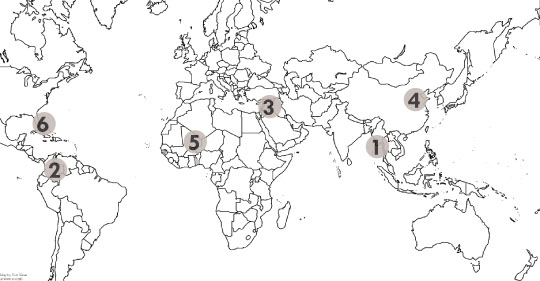February – April, 2012
1. By-elections in Burma
The National League for Democracy (NLD), the opposition party in Burma headed by Nobel Peace Prize laureate Aung San Suu Kyi, won 43 out of the 44 seats it contested in the country’s parliamentary by-elections on April 1.
These were Burma’s first free elections since 1990, when Burma’s standing military government annulled the NLD’s landslide victory in that year’s general elections. Suu Kyi has spent most of the 20 intervening years under house arrest, while her party was outlawed.
The NLD remains a minority party in Burma’s 664-seat national parliament. Reports of voting aberration are widespread.
Nevertheless, the elections round out a spate of reforms that the parliament passed in the last year, including greater press freedom and release of some political prisoners. If judged fair by the international community, the elections may ease economic sanctions against Burma.
2. FARC frees captives, pledges end to kidnapping
The last ten captive police officers and soldiers held by Colombia’s largest rebel guerilla group, the Revolutionary Armed Forces of Colombia (FARC), were released on April 2.
FARC has also said that it will renounce kidnapping civilians for ransom.
Tensions persist between FARC and Colombia’s government. The government alleges that FARC held at least 12 police and military hostages prior to April 2. It also urges the rebel group to release and account for civilians still in its custody.
Ransom from kidnappings is one of FARC’s principal sources of income, though it is now being eclipsed by extortion. The narcotic drug trade remains FARC’s biggest avenue of funds.
The hostages released on April 2 are said to have been among the longest-held in the world, having each lived in the jungle for 12 to 14 years.
3. Ongoing crisis in Syria
Though President Bashir al-Assad’s army has agreed to a pullback of troops, no signs of withdrawal have come so far.
The internationally brokered truce deal by UN-Arab League envoy Kofi Annan called for troops to withdraw by April 10 and a ceasefire by April 12. Assad reportedly accepted Annan’s terms in late March, but the deadline has passed and there has been shelling in the village of Marea and mortar fire in the city of Homs.
Annan remains positive for the possibility of a truce and the restoration of some stability.
4. China censors coup rumours
China has cracked down on a variety of websites as rumours of a possible coup attempt circulate online.
Speculation of fighting within the Communist Party sprouted after Bo Xilai, party chief of a major city, was dismissed from his post amidst in a public scandal. The government censors or blocks any online discussion about Bo. Three of China’s top Internet portals pledged to work with the government to banish online rumour-mongering.
Sixteen websites closed down and multiple micro blogging sites temporarily turned off their comments sections, including QQ and Weibo, a Chinese microblogging platform akin to Twitter. Officials fear such social networking sites as possible springboards for protests and demonstrations in China.
5. Coup d’état in Mali
The Malian army instigated a separatist uprising on March 21.
Dissatisfied with the elected government’s actions to control the northern rebels, the army, called the National Committee of Restoration of Democracy and State, attacked government buildings in Barnako, Mali’s capital, seeking to force President Amadou Toumani Touré to step down.
The military invasion disrupted the government’s regular counteroffensive against Tuareg rebels in the north, and has allowed the Tuareg to push further south and take over Mali’s northern half.
Touré has agreed to step down. Parliamentary speaker Dioncounda Traoré will become interim president. The Tuareg rebels in the north are trying to declare themselves the independent nation of Azawad.
6. Trayvon Martin killing
Trayvon Martin, a 17-year-old African American youth, was fatally shot on Feb. 26 in Sanford, Florida.
The perpetrator, George Zimmerman, was a community watch coordinator licensed to carry a firearm. He was monitoring the neighborhood when he came across Trayvon Martin, who was walking home from 7-Eleven back home. Zimmerman was suspicious and began to follow Martin.
Zimmerman claims that self-defense motivated his decision to shoot. He was charged with second-degree murder on April 11.





